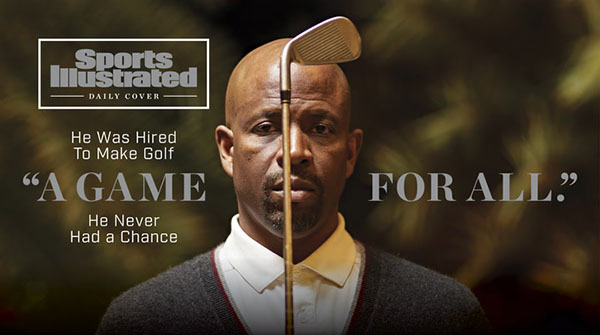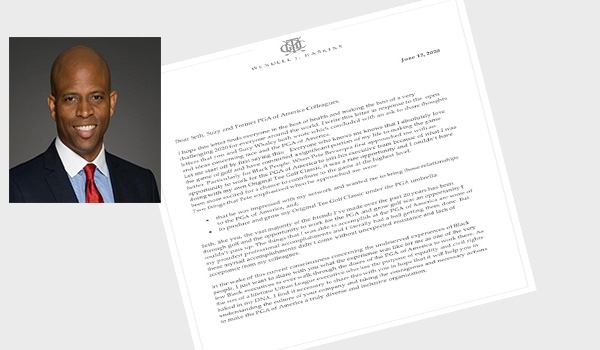
SI Golf: He Was Hired to Make Golf a “Game For All.”
He Never Had a Chance.
(Originally published by Sports Illustrated)
The PGA of America hired Wendell Haskins to make golf “a game for all.” Instead, he says his efforts were cut off and undermined.
Wendell Haskins’ open letter to the PGA of America is making an impact in the world of golf. In addition to a feature article on Sports Illustrated Daily Cover, we celebrate True Original Lee Elder, the first Black man to compete in the Masters Tournament 45 years ago, who has been named Honorary Starter for the 2021 Masters. The work continues…
Barack Obama leaned over and gently fastened the blue ribbon around the 92-year-old man’s neck. This was November 2014, and Charlie Sifford, who was once denied the opportunity to compete on the tour of the Professional Golfers’ Association because of his skin color, was at the White House.
Alongside the family members and dignitaries in the East Room that day was a man named Wendell J. Haskins. This was the moment Haskins had been intent on making happen since he was hired earlier that year as the PGA of America’s new senior director of diversity. It was not easy: He had worked a connection with Alonzo Mourning, who he knew occasionally golfed with the president, asking the former NBA All-Star to plant the seed during a round with Obama. Haskins then spent months collecting dozens letters of support for Sifford from the likes of Arnold Palmer; Jim Brown; Samuel L. Jackson; South Carolina Rep. James E. Clyburn and 63 other bipartisan members of Congress; and Tiger Woods, who wrote that Sifford “helped pave the way for players like me.”
Now, the nation’s first Black president was awarding the Jackie Robinson of golf—the first Black man to compete on the PGA Tour—the Presidential Medal of Freedom. Robinson’s widow, Rachel, had been among the letter writers. Sifford, who once said he rarely smiled as a result of the discrimination he’d endured through his life, beamed.
But there was just one problem: None of the PGA of America’s senior leaders had come to Washington to celebrate Sifford. When it came to bringing racial awareness to golf—and reckoning with the sport’s racist and exclusionary history—Haskins had found it easier to get the ear of the President of the United States than the people he worked with at PGA headquarters.
In a July 2014 email, then PGA of America chief administrative officer Christine Garrity wrote that it was not appropriate for the group to “take credit” for the Sifford initiative “as it should be postured as a collective movement of many organization[s] and people.” She additionally cited the PGA of America’s history of racism and Sifford’s assumed but unconfirmed bitterness toward the organization as a reason to not acknowledge the efforts. “It’s also important to remember history, and it was the PGA that denied Mr. Sifford membership in the organization until 1962, so there is bitterness from Mr. Sifford toward the PGA and the PGA TOUR (rightfully so) that is still palpable for Mr. Sifford,” she continued in the message, reviewed by Sports Illustrated. (Garrity left the PGA of America in 2015; she did not respond to requests for comment.)
 RELATED: Former PGA Senior Director of Diversity Wendell Haskins Sends Counter Letter to PGA Officers
RELATED: Former PGA Senior Director of Diversity Wendell Haskins Sends Counter Letter to PGA Officers
Even if Garrity’s goal was to share credit, though, Haskins says the upshot was a missed opportunity to make amends for the PGA of America’s history of mistreating Sifford. Haskins had wanted to plan a reception around the medal ceremony, which he saw as an opportunity for the PGA of America to forge a stronger connection with the Black community, but was restricted in his efforts. He says that another PGA colleague, Sandy Cross, now the organization’s chief people officer, told him that this was not the time to be planning a party for his friends. (The PGA of America did not make Cross available for an interview.)
Meanwhile, Haskins says the board also denied his petition to expedite Sifford’s candidacy for the PGA of America Hall of Fame. Sifford, who died two months after the medal ceremony, was inducted into the Hall posthumously.
Seth Waugh, who became the PGA of America’s CEO in 2018, said he could not comment on the handling of specific incidents or decisions that were made before he joined the organization. (The PGA of America is a separate entity from the PGA Tour; it oversees the 29,000 golf professionals who work at courses across the country while pursuing its mission to grow the game. The PGA of America also hosts and organizes some tournaments, including the PGA Championship.)
This summer, as sport after sport went through some form of racial reckoning in the wake of George Floyd’s killing, Haskins watched as golf barely took the time for a glance in the clubhouse mirror. What he did see from the PGA of America seemed like it was only surface-level. It brought him back to the neglect and disinterest he says he experienced in his nearly four years working there, and he felt compelled to lay it out on paper. On June 12, he wrote a letter to Waugh and the association’s president, Suzy Whaley.
I find it necessary to share this with you in the hope that it will help you in understanding the culture of your company and taking the courageous and necessary actions to make the PGA of America a truly diverse and inclusive organization.
Haskins’s letter, which he also posted publicly, sent waves through the golf world. Over six pages, he laid out a detailed list of issues and hurdles he says he faced while with the PGA, which he elaborated on to SI, providing emails and other documentation to back his claims. “This isn’t just a PGA of America problem,” says Haskins, 53. “I’ve worked at the PGA of America, but it’s the golf industry that has a problem. My experiences were a reflection of a larger issue.”
All of which raises the central question, as the golf world once again descends on the famously restrictive Augusta National: Is golf finally ready to reckon with racism within the sport?
Read more of this article as originally published at SportsIllustrated.com

